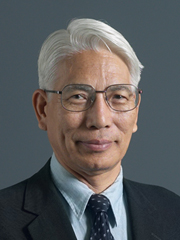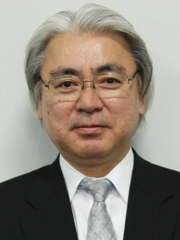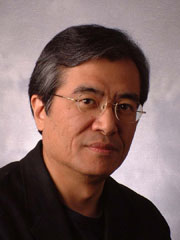
Symposium
IEEE GCCE 2012 has two exceptionally-interesting symposiums by distinguished researchers and business leaders on each morning during the conference.
Future of TelevisionOctober 4th Please come and enjoy the keynote sessions, and share knowledge and their hot ideas.
| Future of Television
Thursday, October 4, 10:00-13:00 |
||||||||||||||||||||
|
Television is evolving by internet connection, smart user interface, cooperation with mobile devices, and higher resolution display. This panel session consists of two sub-sessions: smart TV and high resolution TV. In the smart TV session, collaboration of internet and broadcasting, user friendly television and mobile devices, and the commercial income for the motion pictures will be discussed. In the high resolution TV session, the next generation television with 4K an 8K panel, super resolution technology, and the scenario of super hi-vision will be discussed. Participants will be the key persons of broadcasters, IT companies, electronics companies, and commercial business field.
| ||||||||||||||||||||

|
Dr. Hiroshi Yasuda | |||||||||||||||||||
|---|---|---|---|---|---|---|---|---|---|---|---|---|---|---|---|---|---|---|---|---|
He received the B.E., M.E. and Dr.E. Degrees from the University of Tokyo, Japan in 1967, 1969, and 1972 respectively. Then, he had joined the Electrical Communication Laboratories of NTT in 1972. After served twenty-five years (1972-1997), with the last position of Vice President, Director of NTT Information and Communication Systems Laboratories at Yokosuka, he left NTT and has joined The University of Tokyo. He acted Director of The Center for Collaborative Research (CCR) for 2 years (2003-2005), and he is now a professor, Dean at Tokyo Denki University.His study area is applied information technology. He has been involved in works on Video Coding, Image Processing, Tele-presence, B-ISDN Network and Services, Internet and Computer Communication Applications. Now he has started researches on DRM (Digital Rights Management), Network Security and "Kansei" (more human) communication. He is now advocating collaboration between Industries and Academia. In International Standardizing Area, he had served as the Chairman of ISO/IEC JTC1/SC29 (JPEG/MPEG Standardization) from 1991 to 1999. He had also served as the President of DAVIC (Digital Audio Video Council) from September 1996 to September 1998. He received 1987 Takayanagi Award, 1995 the Achievement Award of EICEJ, 1995-1996 the EMMY from The National Academy of Television Arts and Science, 2000 Charles Proteus Steinmetz Award from IEEE, 2005 Takayanagi Award, 2009 Spring The Medal with Purple Ribbon from The Emperor of Japan and 2011 Industrial Standardization Awards (Prime Minister's Award). He is a Life Fellow of IEEE, Fellow of EICEJ and IPSJ, a member of Television Institute. He wrote "International Standardization of Multimedia Coding" in 1991, "MPEG/International Standardization of Multimedia Coding" in 1994, "The Base for the Digital Image Coding" in 1995, "The Text for Internet" in 1996, "The Text for MPEG" in 2002 and The Text for Content Distribution" in 2003. |
||||||||||||||||||||

|
Mr. Shuichi Fujisawa | |||||||||||||||||||
Shuichi Fujisawa was appointed Head of NHK Science & Technology Research Laboratories (STRL) in April 2012. During his tenure, he will oversee research and development of next-generation broadcasting technology such as Super Hi-Vision and Hybridcast, as well as efforts to improve media accessibility. Prior to his appointment, Fujisawa was Deputy Head of STRL for two years and oversaw the development of all the equipment needed for Super Hi-Vision program production. His efforts helped to make public screenings of the London 2012 Olympic Games in Super Hi-Vision a great success. He worked in the Corporate Planning Department from 2006 to 2010 and was involved with the promotion of digital broadcasting. Fujisawa joined NHK in 1980. He has worked as a technical manager at NHK’s Tokyo Headquarters and has held key posts in the Engineering Administration Department and STRL. Fujisawa received the B.S. from Sophia University in 1979 and is currently a Vice-President of the Institute of Image Information and Television Engineers. |
||||||||||||||||||||
| Symposium: Future of Household Electronic Appliance in the Age of IoT
Friday, October 5, 10:00-13:00 |
|
|
The age of Internet of Things (IoT) has arrived. The common household electronic and electric appliances will become elements of the IoT. They will talk to other devices via network, become aware of the environment (context-aware), be augmented by the intelligence afforded by the Cloud computing, and offer new interactivity through people's smart-phones and mobile devices. The above talk and the following panel session address what will be necessary for this vision to come true, what are the hurdles and the consequences. The panel discussion will touch
Participants will include Google and Microsoft (both confirmed), and others. |
|

|
Prof. Ken Sakamura, Ph.D. |
|---|---|
| Professor The Interfaculty Initiative in Information Studies The Graduate School of the University of Tokyo Director Institute of Infrastructure Application of Ubiquitous Computing |
|
Born in Tokyo in 1951, he is currently a professor of the Interfaculty Initiative in Information Studies at the Graduate School of the University of Tokyo, and the director of Institute of Infrastructure Application of Ubiquitous Computing there. He has been the leader of the TRON project since 1984. In this capacity, he has designed the TRON open computer system architecture, which has been used in many consumer electronics appliances including mobile phones (esp. its radio control), digital cameras, FAX machines, engine control of automobiles, etc. The latest TRON specification OS is called T-Kernel. Today, the IoT (Internet of Things) or Ubiquitous Computing is a major research and development target, and basic research and application developments and leading-edge prototype systems are being built (http://www.t-engine.org/). He has held the position of the director/CEO of YRP Ubiquitous Networking Laboratory since January 2002. He has been elected as fellow and golden core member of the IEEE Computer Society. He was awarded Takeda Award in 2001, Ichimura Academic Award from the new technology development foundation in 2001, the Medal with Purple Ribbon from Japanese government in 2003, and Okawa Prize in 2004, Prime Minister Award in 2005 and Japan Academy Prize in 2006. |
|





